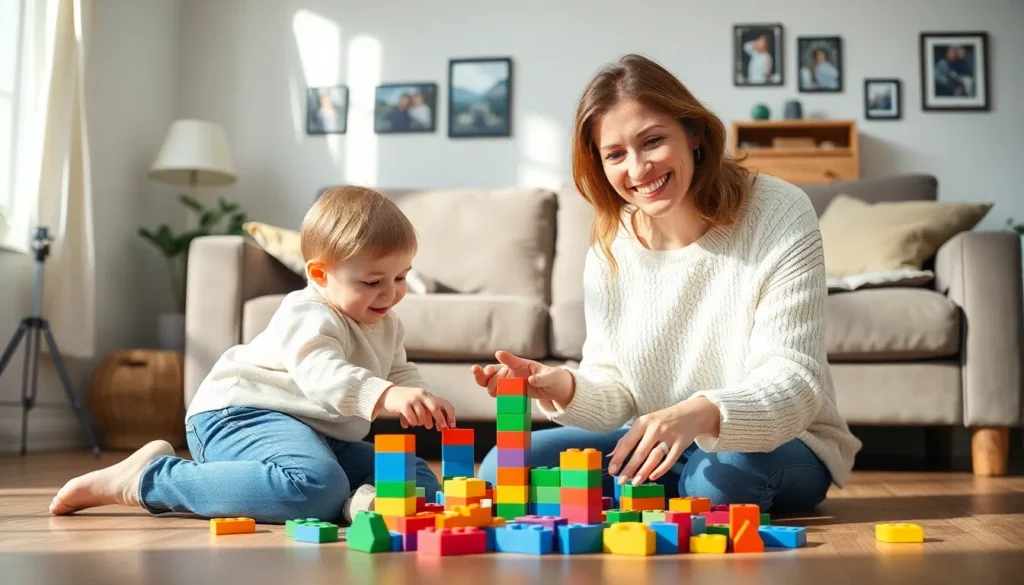Table of Contents
ToggleNavigating the world of parenting can feel like trying to assemble IKEA furniture without the instructions—confusing and a bit overwhelming. When it comes to solo parenting versus single parenting, the terms often get tossed around like hot potatoes at a family reunion. But there’s a difference that can impact everything from bedtime routines to grocery shopping strategies.
Understanding Solo Parenting
Solo parenting refers to raising children without a partner’s support. It involves single caregivers who manage parenting tasks independently while navigating various challenges.
Definition of Solo Parenting
Solo parenting encompasses situations where one parent takes on full responsibility for their child or children. This scenario often arises from various circumstances, including separation, adoption, or the death of a partner. Solo parents make daily decisions regarding their child’s needs, education, and well-being. They balance work and child-rearing duties without shared responsibilities, creating a unique and often demanding parenting experience.
Key Characteristics of Solo Parents
Solo parents demonstrate several distinguishing traits. First, they exhibit strong resilience to manage various daily pressures. Second, they often develop extensive organizational skills to juggle tasks like scheduling appointments and planning meals. Third, they frequently build support networks, relying on friends, family, or community organizations. Additionally, they display a high degree of adaptability, adjusting to their child’s needs during changing circumstances. Lastly, solo parents cultivate strong relationships with their children, fostering trust and open communication.
Exploring Single Parenting

Single parenting involves raising children without a partner’s involvement. This situation often arises from separation, divorce, or a partner’s death. Single parents take on all parenting responsibilities, which can lead to distinctive challenges and rewards.
Definition of Single Parenting
Single parenting refers to one parent raising a child or children independently. This term encompasses a variety of scenarios, including divorced parents, never-married individuals, and widowed caregivers. In these arrangements, the single parent typically manages all aspects of child-rearing, from daily routines to education and emotional support. Clarity around this definition helps to highlight the unique experiences of single parents in contrasting circumstances.
Key Characteristics of Single Parents
Single parents exhibit several key characteristics. Resilience stands out as a fundamental trait, enabling them to navigate the complexities of parenting alone. Strong time management skills become essential, helping them balance work, family, and personal life effectively. Emotional intelligence contributes to their approach, fostering nurturing relationships with their children. Additionally, building support networks plays a crucial role, allowing single parents to seek help from friends, family, and community resources. Finally, adaptability aids single parents in responding to ever-changing family needs and situations.
Comparing Solo Parenting and Single Parenting
Understanding solo parenting and single parenting reveals shared experiences and distinct differences. Both parenting styles demand resilience and adaptability in the absence of a partner.
Similarities Between the Two
Resilience plays a crucial role in both solo and single parenting. Both solo and single parents demonstrate strong time management skills due to the need to juggle various responsibilities. Emotional intelligence frequently emerges as a shared quality, allowing parents to nurture their children’s emotional needs. Support networks become vital for both groups as they seek connection and assistance from friends and family. Open communication remains a cornerstone in both parenting approaches, fostering trust and bonding with children.
Differences Between the Two
Solo parenting often arises from unique situations like adoption or the loss of a partner. Responsibilities in solo parenting solely rest with one person, leading to distinct pressures and decision-making challenges. Single parenting may stem from separation or divorce, often including the complexities of co-parenting. Unlike solo parents, single parents might share responsibilities with an ex-partner, which can influence daily routines and emotional dynamics. The support system also varies; solo parents may need to create networks from scratch, while single parents might already have established connections through shared custody arrangements.
The Challenges Faced in Each Role
Solo parents and single parents encounter distinct challenges while navigating their responsibilities. Understanding these hurdles provides insight into their unique experiences.
Emotional and Psychological Challenges
Solo parents often experience heightened feelings of loneliness. They need to manage their emotions while also supporting their children. Single parents face similar emotional hurdles, particularly concerning feelings of guilt and anxiety. They balance their parenting responsibilities with their personal needs, which can complicate emotional well-being. Building a strong support network becomes essential for both roles. Solo parents might not have immediate access to co-parenting arrangements, making it vital to seek community support. Emotional resilience is crucial to fostering healthy parent-child relationships, as they both strive to maintain stability amid challenges.
Practical Challenges in Daily Life
Daily life for solo parents can be overwhelming due to the absence of shared responsibilities. They manage activities, education, and routines independently, requiring effective time management skills. Single parents also tackle similar practical challenges. Juggling work and parenting duties can present difficulties, especially during emergencies. Both solo and single parents rely on organizational skills to maintain structure in their homes. Meal planning, scheduling events, and overseeing homework become critical tasks. Networking with other parents offers valuable resources, further easing the burdens of daily life. Both parenting styles demand adaptability to navigate these common practical challenges effectively.
Understanding the distinctions between solo parenting and single parenting is crucial for recognizing the unique challenges and rewards each path presents. While both require resilience and adaptability, the circumstances leading to these parenting styles shape their experiences differently. Solo parents often navigate uncharted territory without a partner’s support, while single parents may deal with co-parenting dynamics.
Both roles demand strong time management and emotional intelligence to foster healthy relationships with their children. By building robust support networks and practicing effective communication, parents in both categories can thrive despite their challenges. Ultimately, embracing these differences can empower solo and single parents to create nurturing environments for their children.






